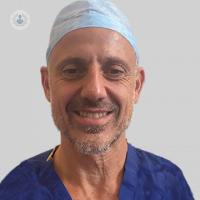How do I know if I have trigeminal neuralgia?
Written by:If you get pain on one side of the face, could it be a problem with your teeth – or could it be trigeminal neuralgia? We spoke to Mr Sinan Barazi, consultant neurosurgeon at the London Neurosurgery Partnership, about who gets trigeminal neuralgia and how it can be treated.

What is trigeminal neuralgia?
Trigeminal neuralgia is a neurological condition that causes patients to feel excruciating pain in one side of the face. It is a rare condition – in the UK, there are only about 27 new cases per 100,000 people each year – and the most likely to be affected are people between the ages of 40 and 70.
What is the pain like?
The pain involved in trigeminal neuralgia is intense – some people describe it as the worst pain they have ever experienced. It comes suddenly in intense bursts, and can be triggered by light touch – from brushing your teeth to even just the wind blowing on your face. Pain is usually felt on one side of the face but can sometimes affect both sides.
Diagnosis of trigeminal neuralgia is difficult and the symptoms can sometimes be confused with dental pain. Some patients even ask for teeth to be extracted before realising this wasn’t the root of their issue. Therefore, a visit to an experienced neurosurgeon or neurologist can be useful.
What causes trigeminal neuralgia?
It is thought that in most cases trigeminal neuralgia occurs when an artery or vein in the face compresses the trigeminal nerve. However, we’re still not sure.
The good news is that even though we don’t know the real cause of trigeminal neuralgia, there are treatments available to manage the pain.
Treating trigeminal neuralgia with medication
Most patients can manage the pain with an anticonvulsant such as carbamazepine or oxcarbazepine. Others initially find the medication effective but might need to increase the dose over time.
The problem with this is that the side effects include:
- difficulty concentrating
- forgetfulness
- feeling off-balance
- sleepiness
At a high dose of the medication, these symptoms can start to really get in the way of daily life, so at this point we would consider surgery instead.
What are the surgical options?
There are several different surgical options for different types of patient:
Microvascular decompression
This aims to lift the artery off the trigeminal nerve and “decompress” the nerve. This can now be performed using an endoscope, which means we can make a smaller incision, and the patient only needs to stay in hospital for 2-5 days after surgery. The outcomes from this procedure are good – about 70% of patients who have this procedure are pain-free even after 10 years.
Percutaneous techniques
Using a needle guided by X-rays, we can perform a number of procedures to intentionally damage the trigeminal nerve and interrupt the pain signals. For example, radiofrequency rhizotomy works by heat to the nerve, whereas the balloon compression procedure involves inflating a small balloon to compress the nerve further.
These techniques are not as effective as microvascular decompression, as in up to half of cases the pain returns after three years. However, they are generally more suitable for frail patients who may not tolerate microvascular decompression.
Radiotherapy
This is a non-invasive procedure that uses Gamma Knife to aim a beam of radiation at the trigeminal nerve. Similar to the various percutaneous techniques, radiotherapy has the advantage of being a less invasive procedure than microvascular decompression, but the trade-off is reduced effectiveness. In about 30-40% of patients the pain will come back after 3 or 4 years.
Overall, patients now have access to a number of treatments thanks to the advances we’ve made in minimally-invasive surgery over the last few years. This should hopefully give patients a reasonable choice over the best procedure for them when dealing with trigeminal neuralgia.


